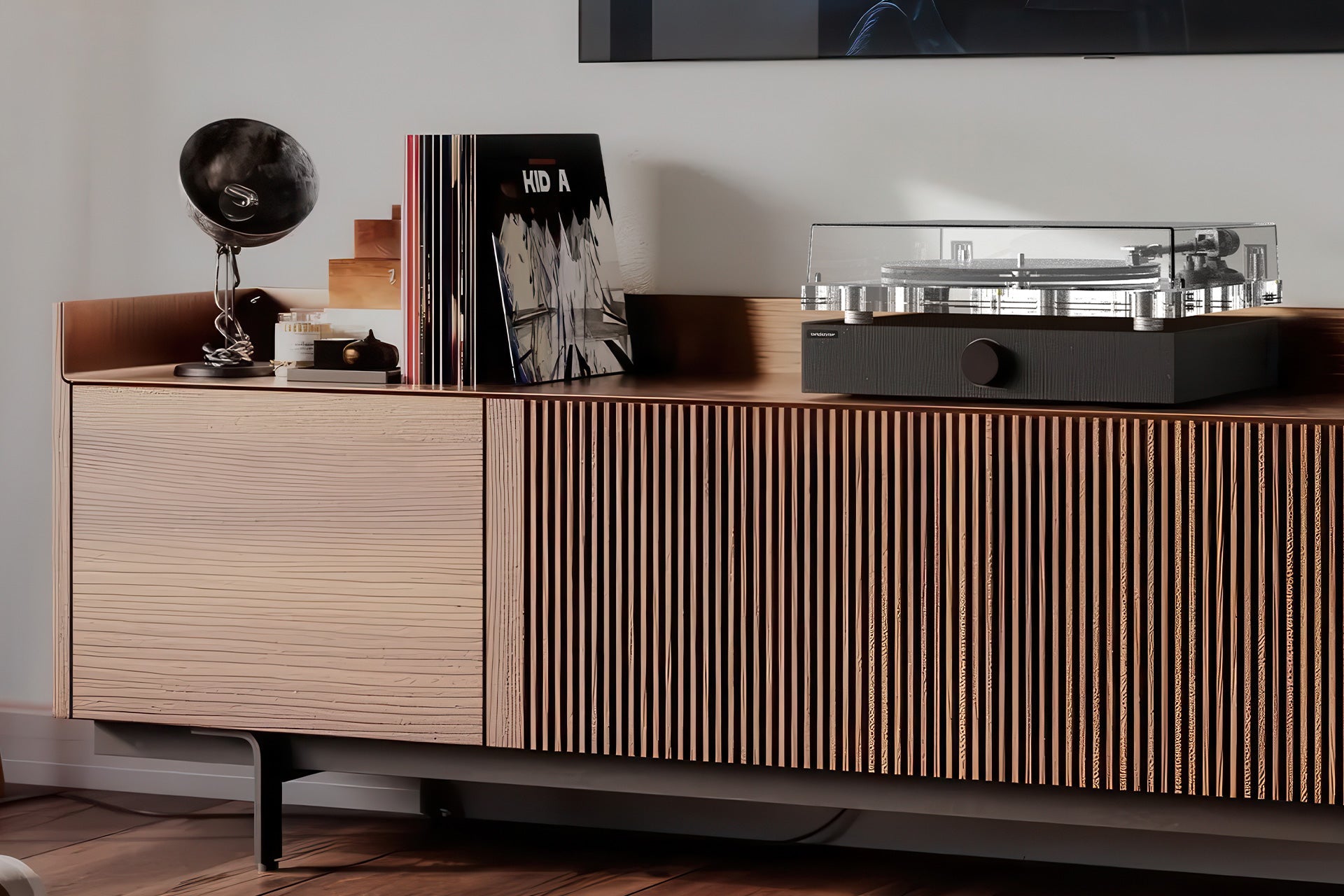Introduction
In the world of audio equipment, turntables, with their unique sound quality and retro charm, remain a top choice for many audiophiles. High-fidelity (Hi-Fi) turntables are particularly popular, offering precise sound reproduction and unparalleled clarity and detail.
However, choosing a Hi-Fi turntable presents a challenge for many consumers, given the plethora of options and brands on the market. This article will delve into the details you need to consider when purchasing a Hi-Fi turntable, helping you better understand how to choose the right one for you, ensuring you make an informed choice based on sound quality, design, and features.
1. Determine Your Budget: Price Variations of Hi-Fi Turntables
Budget is one of the primary considerations when choosing a Hi-Fi turntable. Turntable prices vary significantly depending on the brand, features, and materials used. Therefore, you need to determine the best device based on your personal needs and budget.
The Difference Between High-End and Entry-Level Turntables
High-End Equipment: High-end turntables typically feature more sophisticated components, such as high-quality tonearms, styluses, and more stable turntable systems, enabling them to reproduce sound with greater precision. These devices are suitable for audiophiles who demand the highest quality sound and are typically more expensive.
Entry-Level Equipment: If you're new to turntables or have a limited budget, you can choose an entry-level turntable with decent performance. While the sound quality may not rival that of high-end equipment, it's perfectly adequate for everyday listening and basic use.
Value for Money: Finding the Optimal Balance
Many well-known brands offer excellent value turntables. When choosing a turntable, pay special attention to how these brands balance sound quality and price to ensure you're getting excellent sound quality at a great value.
2. Tonearm and Stylus Quality: Critical Details Affecting Sound Quality
The quality of the tonearm and stylus directly determines the sound quality of a turntable. High-fidelity turntables, in particular, require these components to possess exceptional precision and stability.
Tonearm: Determines Tracking Performance
Material and Weight: High-quality tonearms are typically made of materials such as aluminum alloy and carbon fiber. These materials are not only sturdy but also effectively reduce unwanted vibration, ensuring the stylus accurately follows the record's trajectory.
Adjustability: An adjustable tonearm design allows you to adjust the stylus pressure to suit different records, further enhancing sound quality.
Stylus: A Key Component
Material: High-quality styluses are typically made of diamond or other high-hardness materials, ensuring a longer lifespan and reducing wear on records.
Shape: The shape and design of the stylus directly impact its tracking performance. Common shapes include spherical, oval, and micro-diamond, each suited to different types of music and usage requirements.
3. Turntable Stability and Drive Method: Affecting Speed and Sound Quality
Turntable stability is crucial to sound quality, especially in high-fidelity turntables. Even the slightest speed fluctuation can affect the accuracy of the music reproduction.
Drive Type: Belt Drive vs. Direct Drive
Belt Drive: Belt-driven turntables generally reduce mechanical noise more effectively than direct-drive systems, resulting in cleaner sound quality and making them particularly suitable for users with demanding audio quality.
Direct Drive: Due to their more direct power transmission, direct-drive turntables are suitable for users who frequently adjust the speed or operate the turntable, such as DJs. While the sound quality may be slightly inferior to belt-driven systems, they are still a good choice for general users.
Turntable Material and Design
The material of the turntable also affects its stability. Common turntable materials include aluminum alloy, steel, glass, and plastic. High-end turntables often use heavy-duty materials (such as aluminum alloy or steel) to ensure turntable stability and reduce the impact of vibration on sound quality.
4. Motor and Vibration Control: Reducing Noise and Interference
The quality and stability of the motor directly affect the stable operation of the turntable. Especially in high-fidelity equipment, minimizing the interference of motor vibration on sound quality is a top design priority.
Motor Type and Noise Control
Synchronous Motor: Hi-fi turntables are typically equipped with synchronous motors, which offer stable rotation speed and low noise, making them suitable for those who demand high-quality sound.
Motor Position and Isolation: Many hi-fi turntables utilize motor isolation to reduce the impact of motor vibration on the turntable, thereby enhancing the purity of sound quality.
Vibration Control System
Shock-absorbing Stands: Shock-absorbing stands effectively reduce external vibration interference, especially in the environment where audio equipment is placed. Many hi-fi equipment is equipped with this technology to help maintain stable sound quality.
5. Sound Quality Requirements: Choosing the Right Audio System and Accessories
A hi-fi turntable is more than just a standalone device; its sound quality often requires a high-quality audio system and accessories.
Sound System Compatibility
Speakers: The speakers that match your hi-fi turntable are equally crucial. Whether it's a bookshelf speaker or a floor-standing speaker, ensure the speakers' frequency response, power, and sensitivity match the turntable.
Amplifier: The quality of the amplifier determines the sound quality of the amplified signal. For a high-fidelity turntable, choosing an amplifier with low distortion and high stability is crucial.
Other Accessories
Record Tray: When purchasing records, ensure the appropriate record tray is included. The material and design of the tray affect the stability and sound quality of the records.
Record Cleaning Tools: Keeping your records clean also has a significant impact on their sound quality. Regularly using a vinyl cleaning brush or liquid cleaner can remove dust and maintain clear sound quality.
6. After-Sales Service and Brand Reputation: Ensuring Long-Term Use
When choosing a high-fidelity turntable, brand reputation and after-sales service are crucial factors. Excellent after-sales service ensures the long-term operation of the equipment.
Brand Reputation and Reviews
Reputable Brands: Choosing a brand with a strong reputation in the audio industry ensures a more reliable device. Well-known brands such as Technics, Rega, and Pro-Ject have long-standing reputations among audio enthusiasts.
After-Sales Service and Warranty
Warranty and Repair Support: Understanding the warranty period and availability of repair support can help avoid future hassles. Excellent after-sales service and convenient repair channels provide users with added peace of mind.
Conclusion
Choosing a high-fidelity turntable isn't just about sound quality; it's about comprehensively enhancing the overall audio experience. From budget and purchasing details to component compatibility, brand, and after-sales service, every detail influences your final decision. Through this analysis, we believe you'll gain a clearer understanding of the key factors in choosing a high-fidelity turntable and make an informed decision that's right for you. Whether you're pursuing the ultimate in sound quality or demanding a unique design, the right turntable will provide you with an unforgettable listening experience.












Leave a comment
All comments are moderated before being published.
This site is protected by hCaptcha and the hCaptcha Privacy Policy and Terms of Service apply.